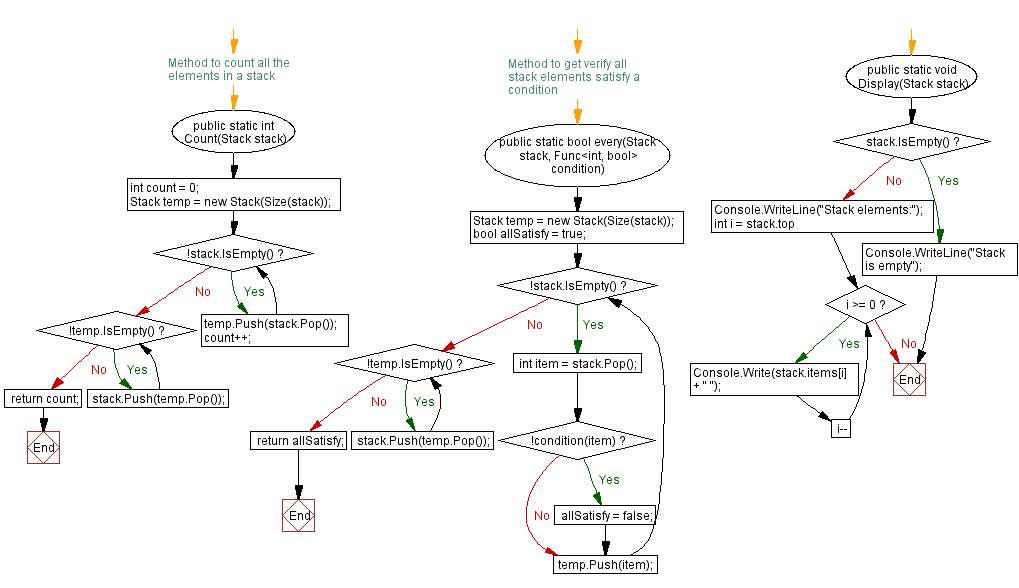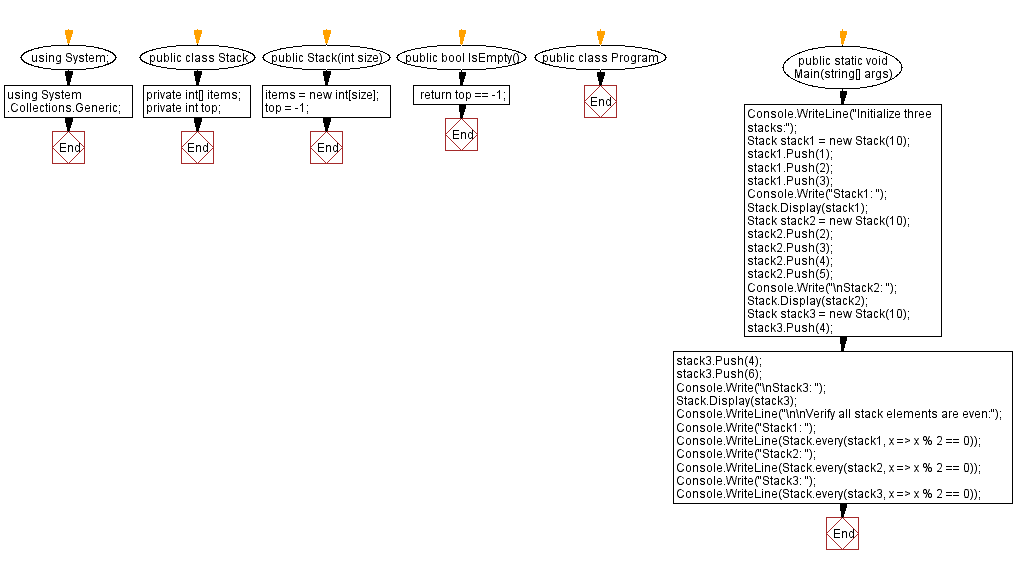C#: Verify all stack elements satisfy a condition
Write a C# program that implements a stack and checks if all elements of the stack satisfy a condition.
Sample Solution:
C# Code:
using System;
using System.Collections.Generic;
public class Stack
{
private int[] items; // Array to store stack elements
private int top; // Index indicating the top element in the stack
// Constructor to initialize the stack with a specified size
public Stack(int size)
{
items = new int[size]; // Create an array of integers with the given size
top = -1; // Initialize top index to -1, indicating an empty stack
}
// Check if the stack is empty
public bool IsEmpty()
{
return top == -1; // Returns true if the stack is empty
}
// Check if the stack is full
public bool IsFull()
{
return top == items.Length - 1; // Returns true if the stack is full
}
// Push an element onto the stack
public void Push(int item)
{
if (IsFull())
{
Console.WriteLine("Stack Full!"); // Display a message indicating stack overflow if the stack is full
return;
}
items[++top] = item; // Increment top and add the item to the stack
}
// Pop an element from the stack
public int Pop()
{
if (IsEmpty())
{
Console.WriteLine("Stack underflow"); // Display a message indicating stack underflow if the stack is empty
return -1;
}
return items[top--]; // Return and decrement top to remove the element from the stack
}
// Peek at the top element of the stack without removing it
public int Peek()
{
if (IsEmpty())
{
Console.WriteLine("Stack is empty"); // Display a message indicating the stack is empty
return -1;
}
return items[top]; // Return the top element of the stack
}
// Static method to get the size of a stack
public static int Size(Stack stack)
{
return stack.top + 1; // Return the size of the stack based on the current top index
}
// Method to count all the elements in a stack
public static int Count(Stack stack)
{
int count = 0;
Stack temp = new Stack(Size(stack));
// Move elements from the original stack to a temporary stack and count them
while (!stack.IsEmpty())
{
temp.Push(stack.Pop()); // Move elements from the original stack to the temporary stack
count++; // Increment count for each element moved
}
// Restore the original stack by moving elements back from the temporary stack
while (!temp.IsEmpty())
{
stack.Push(temp.Pop()); // Move elements back to the original stack
}
return count; // Return the total count of elements in the stack
}
// Method to verify if all stack elements satisfy a given condition
public static bool every(Stack stack, Func<int, bool> condition)
{
Stack temp = new Stack(Size(stack));
bool allSatisfy = true;
while (!stack.IsEmpty())
{
int item = stack.Pop();
if (!condition(item)) // Check if the condition is not satisfied for any element
{
allSatisfy = false; // Update flag to indicate not all elements satisfy the condition
}
temp.Push(item); // Push the element to the temporary stack
}
while (!temp.IsEmpty())
{
stack.Push(temp.Pop()); // Restore the original stack by moving elements back
}
return allSatisfy; // Return whether all elements satisfy the condition
}
// Method to display the elements of the stack
public static void Display(Stack stack)
{
if (stack.IsEmpty())
{
Console.WriteLine("Stack is empty"); // Display a message if the stack is empty
return;
}
Console.WriteLine("Stack elements:");
for (int i = stack.top; i >= 0; i--)
{
Console.Write(stack.items[i] + " "); // Display elements of the stack
}
}
}
public class Program
{
public static void Main(string[] args)
{
Console.WriteLine("Initialize three stacks:");
Stack stack1 = new Stack(10);
stack1.Push(1);
stack1.Push(2);
stack1.Push(3);
Console.Write("Stack1: ");
Stack.Display(stack1);
Stack stack2 = new Stack(10);
stack2.Push(2);
stack2.Push(3);
stack2.Push(4);
stack2.Push(5);
Console.Write("\nStack2: ");
Stack.Display(stack2);
Stack stack3 = new Stack(10);
stack3.Push(4);
stack3.Push(4);
stack3.Push(6);
Console.Write("\nStack3: ");
Stack.Display(stack3);
Console.WriteLine("\n\nVerify all stack elements are even:");
Console.Write("Stack1: ");
Console.WriteLine(Stack.every(stack1, x => x % 2 == 0));
Console.Write("Stack2: ");
Console.WriteLine(Stack.every(stack2, x => x % 2 == 0));
Console.Write("Stack3: ");
Console.WriteLine(Stack.every(stack3, x => x % 2 == 0)); ;
}
}
Sample Output:
Initialize three stacks: Stack1: Stack elements: 3 2 1 Stack2: Stack elements: 5 4 3 2 Stack3: Stack elements: 6 4 4 Verify all stack elements are even: Stack1: False Stack2: False Stack3: True
Flowchart:



Go to:
PREV : New stack from a portion of the original stack.
NEXT :
Verify at least one element satisfy a condition.
C# Sharp Code Editor:
Improve this sample solution and post your code through Disqus
What is the difficulty level of this exercise?
Test your Programming skills with w3resource's quiz.
